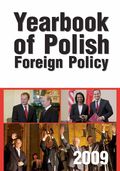Poland’s Policy Regarding Germany
Poland’s Policy Regarding Germany
Author(s): Natalia Kohtamäki Subject(s): Politics / Political Sciences
Published by: PISM Polski Instytut Spraw Międzynarodowych
Keywords: Germany; poland policy foreign
Summary/Abstract: Poland’s transition and Germany’s unification process brought in their wake deep changes in Polish-German relations. “The Polish-German community of interests” heralded in 1990 by then Minister of Foreign Affairs Krzysztof Skubiszewski was to become a new form of shaping mutual relations on a dialogue basis. Anxious to maintain a tension-free climate in bilateral relations, the two countries’ ruling elites came to sidestep controversial subjects, such as damages for Polish wartime slave laborers or claims of expelled Germans—with the result that by the late 1990s these unvoiced issues became a heavy burden on relations between Poland and Germany. Opinions that there was a “void” between Poland and Germany were not uncommon. The mounting of tensions was reflected in disagreement over the institutional reform of the European Union, the Iraq war and the Center against Expulsions. German expellees’ claims for restoration of property became yet another sensitive issue with a potential for souring mutual relations. Poland’s confidence in Germany was running low, largely due to the Germany-Russia rapprochement symbolized by the September 2005 Nord Stream agreement between Chancellor Gerhard Schröder and President Vladimir Putin.
Journal: Yearbook of Polish Foreign Policy
- Issue Year: 2009
- Issue No: 01
- Page Range: 88-106
- Page Count: 19
- Language: English

